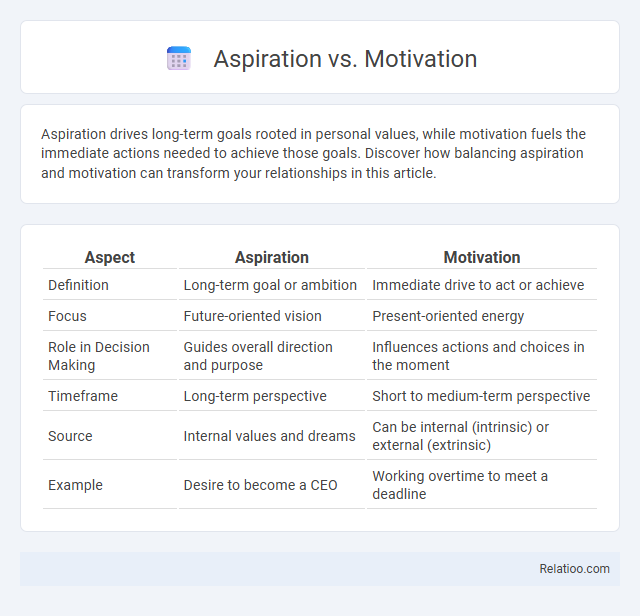Aspiration drives long-term goals rooted in personal values, while motivation fuels the immediate actions needed to achieve those goals. Discover how balancing aspiration and motivation can transform your relationships in this article.
Table of Comparison
| Aspect | Aspiration | Motivation |
|---|---|---|
| Definition | Long-term goal or ambition | Immediate drive to act or achieve |
| Focus | Future-oriented vision | Present-oriented energy |
| Role in Decision Making | Guides overall direction and purpose | Influences actions and choices in the moment |
| Timeframe | Long-term perspective | Short to medium-term perspective |
| Source | Internal values and dreams | Can be internal (intrinsic) or external (extrinsic) |
| Example | Desire to become a CEO | Working overtime to meet a deadline |
Understanding Aspiration: Definition and Significance
Aspiration refers to a strong desire or ambition to achieve long-term goals, distinguishing it from motivation, which drives immediate actions, and inspiration, which sparks creative ideas. Understanding aspiration is significant because it fuels persistent effort and guides personal growth by providing a clear vision of future achievements. This concept plays a crucial role in goal-setting theory, emphasizing the importance of intrinsic desires in achieving sustained success.
What is Motivation? Key Concepts Explained
Motivation is the internal drive that propels you to take action toward a goal, often influenced by both intrinsic desires and external rewards. It fuels persistence, focus, and energy necessary for achieving objectives, differing from aspiration, which is an ideal or ambition you strive to reach. Understanding motivation's role in behavior helps optimize goal-setting and personal development strategies for lasting success.
Aspiration vs Motivation: Core Differences
Aspiration represents a long-term vision or an ideal goal that drives personal growth, whereas motivation refers to the immediate drive or energy to take action toward achieving specific tasks. Aspiration is often linked to intrinsic desires and future-oriented ambitions, while motivation can be both intrinsic and extrinsic, directly influencing behavior and effort in the present. Understanding the core difference between aspiration and motivation is key to aligning personal goals with actionable steps and sustained effort.
The Psychological Roots of Aspiration and Motivation
Aspiration stems from deep-seated desires linked to personal values and long-term goals, while motivation often arises from immediate needs or external incentives triggering action. The psychological roots of aspiration involve intrinsic factors such as self-identity and future self-concept, contrasting with motivation's foundation in both intrinsic and extrinsic drivers like rewards or fear of failure. Understanding how your aspirations shape motivation can unlock powerful pathways for sustained personal growth and achievement.
How Aspirations Shape Long-Term Goals
Aspirations serve as powerful drivers that shape your long-term goals by providing a clear vision of what you want to achieve in life, distinguishing them from motivation, which fuels immediate actions, and ambition, which reflects strong desires for success. They create a framework for sustained effort, aligning your daily decisions and behaviors with future achievements. Understanding the unique role aspirations play helps you cultivate resilience and purpose essential for reaching enduring milestones.
The Role of Motivation in Daily Habits
Motivation drives Your daily habits by providing the emotional energy and focus needed to initiate and maintain consistent actions toward goals. Unlike aspiration, which represents long-term desires, motivation acts as the immediate catalyst that transforms intentions into routine behaviors. Understanding the role of motivation helps optimize productivity and reinforces habit formation essential for achieving success.
Interplay Between Aspiration and Motivation
Aspiration fuels your long-term vision by defining desired achievements, while motivation drives the energy and commitment needed to pursue those goals. The interplay between aspiration and motivation creates a dynamic cycle where clear aspirations enhance motivation, and sustained motivation helps realize those aspirations. Understanding this relationship enables you to set meaningful objectives and maintain the focused effort essential for success.
Overcoming Obstacles: Harnessing Both Forces
Overcoming obstacles requires harnessing both aspiration and motivation, where aspiration sets the visionary goal and motivation drives sustained effort through challenges. Aspiration provides a clear destination, inspiring resilience, while motivation fuels the continuous actions needed to navigate setbacks and achieve progress. Combining these forces creates a powerful dynamic that transforms obstacles into stepping stones for success.
Real-life Examples: Aspiration vs Motivation in Action
Aspiration drives long-term goals such as a medical student aiming to become a surgeon, while motivation fuels the daily efforts like studying anatomy chapters each night. Real-life examples show athletes aspiring to win championships but relying on motivation to train consistently despite setbacks. Entrepreneurs may aspire to launch innovative startups but depend on motivation to navigate early failures and persist in growth strategies.
Strategies to Cultivate Aspiration and Sustain Motivation
Strategies to cultivate aspiration involve setting clear, meaningful goals aligned with personal values and long-term vision, fostering a sense of purpose that drives ambition. Sustaining motivation requires regular reinforcement through positive feedback, habit formation, and resilience-building techniques such as mindfulness and self-reflection to overcome setbacks. Combining goal-setting frameworks like SMART goals with intrinsic motivators enhances both aspiration clarity and continuous motivational energy essential for achievement.

Infographic: Aspiration vs Motivation
 relatioo.com
relatioo.com